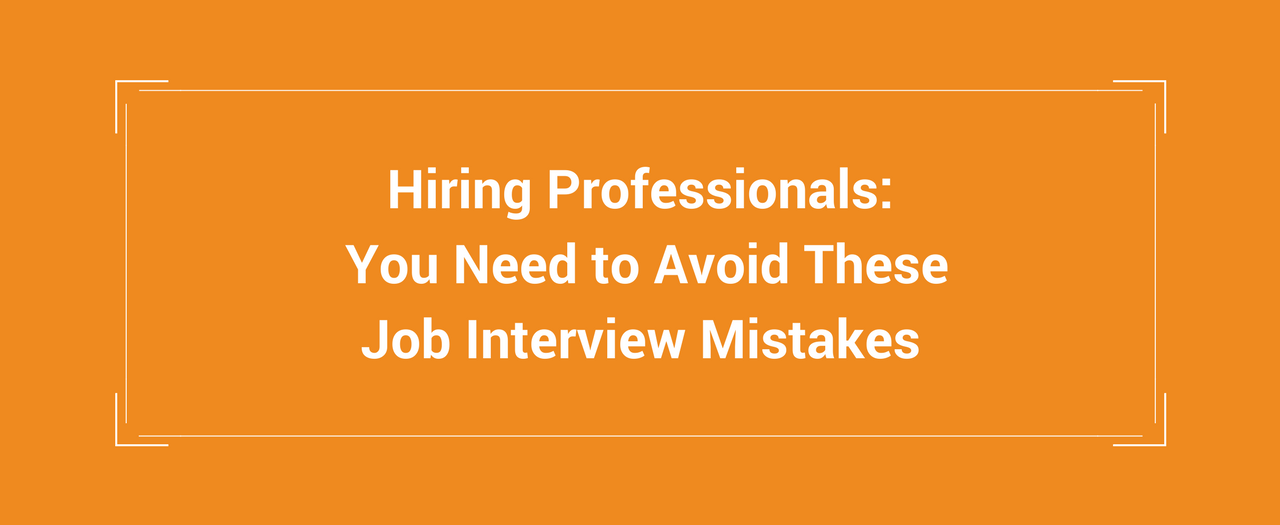You take a look at your notes from the job interviews you conducted today. The first candidate couldn’t maintain good eye contact. The second one was overly fidgety. The third tended to ramble, and the fourth seemed uninformed about the company.
In fact, you saw almost every basic job interview mistake.
As an HR professional, it’s your job to notice those types of behaviors. It helps you assess which candidate will be the best fit for the position. But there is a type of mistake you are likely missing during a job interview: the one you make.
Maybe you come off as cold or ask the wrong questions. Not being aware of your errors can affect talent’s impression of the company. It influences both their responses and ultimate decision to work for you.
In fact, a 2016 CareerArc study found that 60 percent of job seekers have had a poor experience when applying for a job. Candidate experience has a major impact on your brand and company growth.
Don’t miss out on great employees because of a silly job interview mistake. Here are three experts’ opinions on behaviors to avoid:
1. Stop trying to fool candidates
 Every position has its bad side. There’s no point in trying to hide that from job candidates. They’ll either sense you’re hiding something or figure it out soon after taking the job.
Every position has its bad side. There’s no point in trying to hide that from job candidates. They’ll either sense you’re hiding something or figure it out soon after taking the job.
Yet many HR professionals are worried being honest will scare people off, so they downplay certain negative aspects of the job.
“Don’t gloss things over,” said Suzanne Lucas, the HR expert behind the blog Evil HR Lady. “Just talk about the job and the candidate’s experience.”
What to do instead:
Be upfront and honest. Lucas likes to tell candidates the three worst parts of the position and ask how they feel about those conditions.
“Getting the right person on board means hiring the person who is okay with the worst parts of the job,” she pointed out. “Be totally honest. Is it a micro-managing VP? Are there clients who don’t understand the meaning of the word ‘weekend’? Is the pay low and hours long? Lay it all out and then ask for their feedback.”
If nothing you say is a deal-breaker for the candidate, you can be confident of their interest in the job and your organization.
2. Listen more
 During a job interview, it’s important for you to not dominate the conversation. Yes, you need to answer the candidate’s questions and explain the details of the job, but not at the expense of getting to know the candidate.
During a job interview, it’s important for you to not dominate the conversation. Yes, you need to answer the candidate’s questions and explain the details of the job, but not at the expense of getting to know the candidate.
“Interviewers should spend much more time listening than they spend talking,” said Sue Meisinger, SPHR, JD. “Too often an interviewer will get so absorbed in describing the company and the job that they leave too little time for listening to and learning about the candidate.”
What to do instead:
Make sure your interview questions are open-ended and provide candidates with a chance to expand. If you’re only asking yes or no questions, you’ll receive very little insight about who they are. For Meisinger, she likes her questions to be thought-provoking.
“I liked to ask candidates to share with me a time in their career when they were the focus of some controversy,” she said. “What was the issue and how did they handle it? I ask the question because no job is without controversy and stress, and I like to get a sense of how people approach those situations.”
3. Don’t let hiring bias influence you
 Hiring bias is real. While it isn’t always overtly about race, ethnicity, gender, or sexual orientation, people tend to favor hiring candidates who are similar to them. This leads to you overlooking great talent unless you consciously try to keep biases in check.
Hiring bias is real. While it isn’t always overtly about race, ethnicity, gender, or sexual orientation, people tend to favor hiring candidates who are similar to them. This leads to you overlooking great talent unless you consciously try to keep biases in check.
“If the candidate and the hiring manager have the same alma mater or are from the same town, there’s an instant connection between them,” said Heather Huhman, founder and president of Come Recommended. “Seeing similarities in candidates can be dangerous if those traits aren’t pertinent to the position. You could end up hiring someone who isn’t the best option.”
What to do instead:
Get second opinions on your top candidate choices. If you use pre-recorded one-way video interviews, share the videos with another team member, then ask them for input.
“Whenever I’m hiring, I have a trusted person I turn to,” said Huhman. “If her perceptions of the candidates align with mine, I know there’s less of a chance that my own biases are influencing my decisions.”
It also helps if you have a clear, objective criteria to evaluate candidates. That can keep you and other hiring team members focused when assessing job seekers during an interview.
Nobody’s perfect. But as an HR professional, you need to be aware of common mistakes you might make during a job interview. Knowing how you could be negatively impacting your talent choices will help you hire the best of the best.
—
Want more tips on improving your job interview process? Download our eBook!











